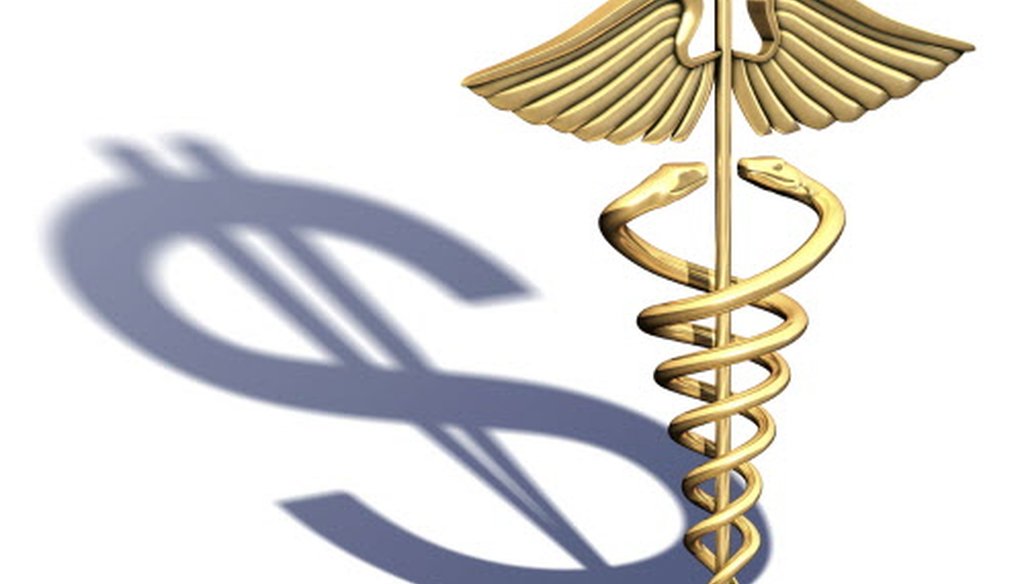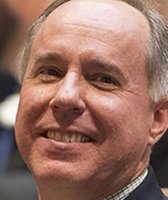Stand up for the facts!
Our only agenda is to publish the truth so you can be an informed participant in democracy.
We need your help.
I would like to contribute

While there is no formal cost estimate for Sen. Bernie Sanders’ 'Medicare for All" bill, experts mostly agree that the cost would be "enormous."
The debate over how to provide health care in the United States has roiled the political waters for years, reaching a boiling point in 2010, when President Barack Obama signed the Affordable Care Act into law.
The continued effort by Republicans to repeal and replace what has been termed "Obamacare" re-ignited the push by some Democrats for a single-payer health care system.
U.S. Sen. Tammy Baldwin, who faces re-election in November 2018, is a co-sponsor of U.S. Sen. Bernie Sanders’ "Medicare for all" bill. Her opponent, Republican Leah Vukmir has strongly criticized that single-payer approach, saying it will drive up costs for taxpayers.
U.S. Sen. Ron Johnson, a Republican, has made similar comments. During a Sept. 4. 2018, interview with WISN-AM radio host Vicki McKenna, Johnson responded to a question about Baldwin’s support for a single-payer health system by saying:
"You could double every American’s tax bill and it still wouldn’t pay for it. It sure sounds good: ‘Free health care for everybody.’ But it’s not free."
Sign up for PolitiFact texts
Is Johnson right about a doubled tax bill?
It’s a provocative claim, to be sure. But we decided to withhold, for now, a rating of Johnson’s statement because there is no formal cost estimate for Sanders’ bill, estimates by experts vary widely, the competing projections rely on different assumptions, and there are other unknowns.
We do know this much:
1. The only point of agreement appears to be that a single-payer health care system would involve an enormous government cost. This is because it would bring the operations of a massive health care system together. According to the Centers for Medicare and Medicaid Services, U.S. health care spending grew 4.3 percent in 2016, reaching $3.3 trillion or $10,348 per person. As a share of the nation's Gross Domestic Product, health spending accounted for 17.9 percent.
2. The effect on individuals would vary widely. It’s unlikely that everyone’s taxes would simply double. Any tax increase would vary from person to person, depending on what taxes are used and factors such as income and deductions.
Since a single-payer system has become a key issue in the race, here is some background and context for voters.
What is single-payer health care?
According to the group Physicians for a National Health Program, a single-payer national health insurance system is one in which a single public or quasi-public agency sets prices and pays for health care, but the delivery of care remains largely in private hands.
Under a single-payer system, all U.S. residents would be covered for medical services, such as doctor and hospital visits; preventive, long-term and behavioral health care, dental, vision and other care.
Backers say the plan would cut administrative costs, help slow the increase in health care spending, improve access and simplify the health care system. Opponents say it would be too costly, result in lower quality care and would amount to the government takeover of health care.
One key difference for consumers: It would mean private insurance companies would mostly be eliminated, so paycheck deductions and co-pays would disappear. That’s important in evaluating the impact on taxpayers.
The "Medicare for all’ plan
The plan, according to information outlined on the senator’s website, would be paid for by:
-
A 6.2 percent income-based health care "premium" (tax) paid by employers
-
A 2.2 percent income-based "premium" (tax) paid by households
-
Progressive income tax rates
Under this plan,the marginal income tax rate would be:
-
37 percent on income between $250,000 and $500,000.
-
43 percent on income between $500,000 and $2 million.
-
48 percent on income between $2 million and $10 million.
-
52 percent on income above $10 million.
The plan also references funding from taxing capital gains and dividends the same as income from work, limiting tax deductions for the rich and a "responsible" estate tax.
Winners and losers
A New York Times article "How Medicare for All would affect you," offered an analysis of the plan’s pros and cons. It noted:
People insured through work would have new taxes, but no more premiums.
People with Medicaid would have more choices, but possibly higher taxes.
People currently with Medicare would have more generous coverage.
The uninsured would all get health care.
People who buy their own insurance would have new taxes, but less out-of-pocket spending.
Doctors and hospitals would likely face pay cuts, but would no longer face unpaid bills.
Drug companies would likely have less profits.
Health insurance companies would mostly be eliminated.
Estimates vary
Patrick McIlheran, a communication and policy adviser for Johnson, said the senator was referring to a July 2018 report by Charles Blahous, senior research strategist at the Mercatus Center at George Mason University. Blahous served as a public trustee for Social Security and Medicare from 2010-'15.
The center is described as a non-profit free-market-oriented research, education, and outreach think tank. Blahous’ expertise includes domestic economic policy, federal fiscal policy and health care programs.
According to Blahous’ report, Sanders’ "Medicare for all" bill "would under conservative estimates increase federal budget commitments by approximately $32.6 trillion during its first 10 years of full implementation (2022–2031), assuming enactment in 2018."
In the report, Blahous wrote that "doubling all currently projected federal individual and corporate income tax collections would be insufficient to finance the added federal costs of the plan. In a Wall Street Journal commentary, Blahous wrote.
"My projection generously assumes the plan would succeed in lowering prescription-drug costs and that administrative costs would somehow be less than half what they are among private insurers. Most important, it assumes Medicare for All would successfully cut all health-care provider payments down to Medicare’s reimbursement rates, which are more than 40% lower than private insurance rates — and even below providers’ costs of delivering services."
Nevertheless, his report has faced a whirlwind of controversy.
Critics -- including Baldwin’s staff -- note the cost estimates are not official and have not been vetted by the Congressional Budget Office. They also question their impartiality, noting the Mercatus Center has links to the conservative Koch brothers. (Koch Industries CEO Charles Koch is listed on the Mercatus Center website as a board member and the center receives funding from the brothers.)
Meanwhile, According to Sanders’ website, his "Medicare for all" proposal has been estimated to cost $1.38 trillion per year.
Other health policy experts have put the single-payer health plan price tag much higher, with price tags ranging from $2.4 trillion a year to $2.8 trillion a year.
What other experts say
Kenneth Thorpe, a health policy professor at Emory University in Atlanta, in an interview with CBS News, said the cost of a single-payer system would be "enormous."
"It's showing that if you are going to go in this direction, it's going to cost the federal government $2.5 trillion to $3 trillion a year in terms of spending," said Thorpe, a senior health policy adviser in the Clinton administration.
Jodi Liu, associate policy researcher at the RAND Corp., a nonprofit think tank, said "even if aggregate federal health care spending were to double, this does not mean that every American’s tax bill would double."
Lydia Austin of the Urban-Brookings Tax Policy Center noted Congressional Budget Office projections show receipts of $44 trillion from 2019-’28, a 10-year period. By that measure, she said, "the federal government would need to less than double revenues to generate $32.6 trillion over the 10-year budget window."
Our Sources
iHeartRadio, "Vicki McKenna on WISN," Sept. 4, 2018, about 18:09 mark.
George Mason University, "The Costs of a National SIngle-Payer Healthcare System," July 30, 2018.
PolitiFact Wisconsin, "Tony Evers wrong to blame Scott Walker’s rejection of Medicaid money for higher health costs," Sept. 7, 2018.
Milwaukee Journal Sentinel, "Wisconsin Senate race: Leah Vukmir jabs Tammy Baldwin on taxes, health care and Tomah," August 15, 2018.
CNBC.com, "Here’s how much Americans pay in taxes in every U.S. state," April 5, 2018.
Tax Foundation, "Tax Freedom Day 2018 is April 19th"
CBS News, "Medicare for all plan touted by Bernie Sanders would cost $32 trillion."July 30, 2018.
The Mercatus Center at George Mason University "The costs of a national single-payer healthcare system,"
Email, Jodi Liu, associate policy researcher, The RAND Corporation, Sept. 19, 2018.
Email, Patrick McIlheran, communications and policy adviser, Sen. Ron Johnson staff, Sept. 19, 2018.
Email, Josh Miller-Lewis, Sen. Bernie Sanders’ communications director, Sept. 21, 2018.
Email, Lydia Austin, Senior Manager Urban-Brookings Tax Policy Center, Sept. 26, 2018.
The Mercatus Center at George Mason University.
The Hill "Senator asks for CBO score of Sanders’ single-payer bill," Sept. 14,2017.
Physicians for a National Health Program "What is Single-Payer?"
The Intercept, "Koch-funded think tank linked to George Mason University is now pretending it’s not part of George Mason University," Sept. 19, 2018.
The Mercatus Center at George Mason University, "Charles Koch, board member"
Time magazine, "Medicare for all’ could cost $32.6 trillion, George Mason study says," July 30, 2018.
Jacobin, "Even Libertarians Admit Medicare for All Would Save Trillions," July 30, 2018.
Economics21.org "Commentary: Questions and Answers about Medicare for All’s costs," August 21, 2018.
Milwaukee Journal Sentinel, "Health care costs for the typical family of our top $28,000 this year, despite slower increases,"June 4, 2018
U.S. Congress A Bill to establish a Medicare-for-all national health insurance
program.
The Los Angeles Times, "A Koch-funded think tank tries hard to pretend that it didn’t find savings from Bernie Sanders’ Medicare plan."
www.berniesanders.com "Medicare for All: Leaving no one behind."
Wall Street Journal, "Even doubling taxes wouldn’t pay for ‘Medicare for all," August 1, 2018.
Centers for Medicare and Medicaid Services, "Projected Medicare Expenditures under an Illustrative Scenario with Alternative Payment Updates to Medicare Providers," June 5, 2018.
Centers for Medicare and Medicaid Services, "National Health Expenditure Data," Jan. 8, 2018.
New York Times, "How Medicare for All affects you," Sept. 14, 2017.









































